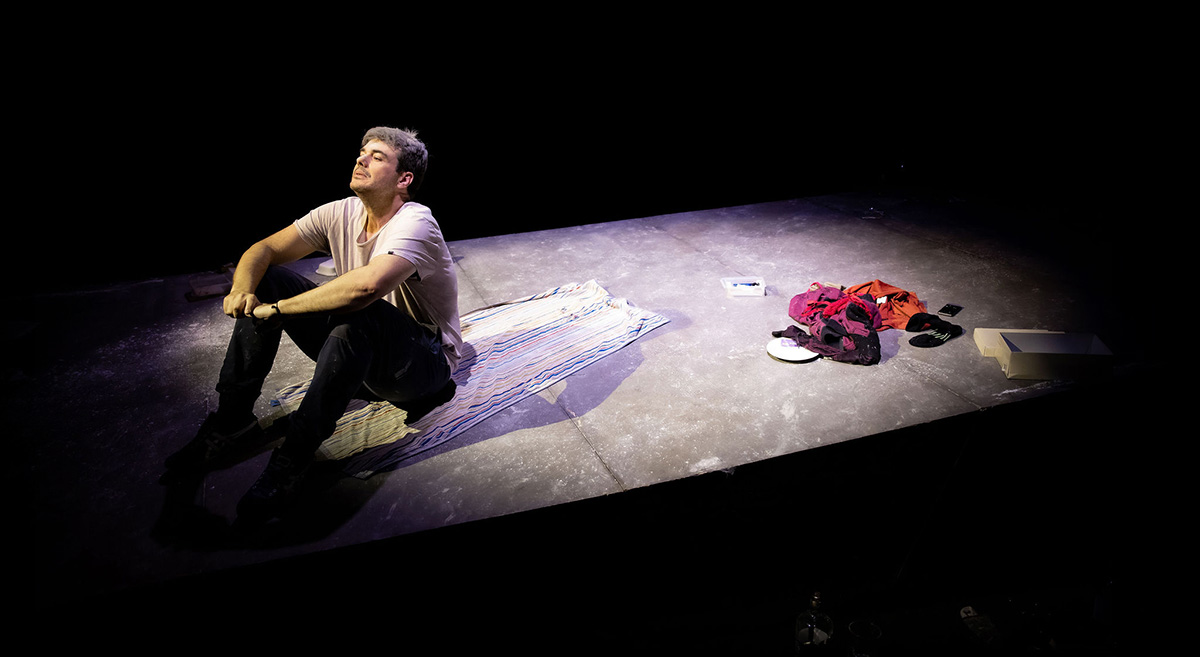REVIEWS: London 2023
Pleasance London – Best of Edinburgh Fringe Festival, October 2023
The Old Red Lion Theatre, November 2023
THE NEW CURRENT
★ ★ ★ ★ ★
31 October, 2023
One of the benefits of living in London is knowing that even if you miss Edinburgh Fringe, venues like Pleasance will have a post-festival series, which gives audiences the opportunity to see the wide-ranging theatre that’s on offer at the Fringe. One of the undeniable hits of the 2023 Fringe was Peter Cook’s Breaking The Castle, a one-man play about addiction that is drawn from Cook’s own life and experiences.
Words are fickle when you are trying to describe something like Breaking The Castle. Words become irrelevant as you try to offer something positive and honest to the reader because they should know that the production they might see is not just worthy of their time but that they will feel more inspired by seeing it. Breaking The Castle is a rare production that never lets you go. It doesn’t preach, but it preaches; this becomes its default setting as soon as you forge this connection with “David” that Cook establishes the minute we see him.
David is an addict, and with his acting career nearly failing to launch and personal issues that have started to entrench themselves in his subconscious, David has fallen deeper into his dependency on drugs. A chance meeting with an old, rich friend provides David with a life-changing opportunity: rehab in Thailand. Initially, there is reluctance as David traverses the rules of rehab, the people, their stories, and the importance all this means for him and his life. Caught at somewhat of a crossroads, David, eager to leave, finds himself swayed by one of the rehab nurses and decides to. This decision is ultimately the first step he takes in wanting to save his life, and as layer after layer falls off, it reveals a man who has never taken a moment to look inward and to understand the role trauma has played in his life.
When we first meet David, he’s walking around his old stomping ground. He's sober and has started to see the benefits of his rehab. On meeting an old friend from his addict days, he’s almost drawn back into the time he’s managed to pull himself out of. Talking to his friend, a lost soul who has no chance of being able to smell how fresh and freeing life can be, David wonders if he’s really about to stick to his sobriety. Without judgement and without passing comment, David extricates himself from his old friend, and with a deep, meaningful look in his eyes, he looks back at him and wishes him well.
Breaking The Castle is a play that has many layers to it and offers audiences a genuine insight into addiction and the people it impacts. Writer and performer Peter Cook’s decision to use his own life and experiences uplifts the piece greatly, and audiences will be thankful for it. One of the biggest strengths of the piece lay in Cook’s ability to make “David” so honest and relatable. As we follow David from a drug-filled life to rehab, we grow to understand that there are a million and one reasons why someone finds themselves in a situation like this. It’s also a situation that anyone can find themselves in.
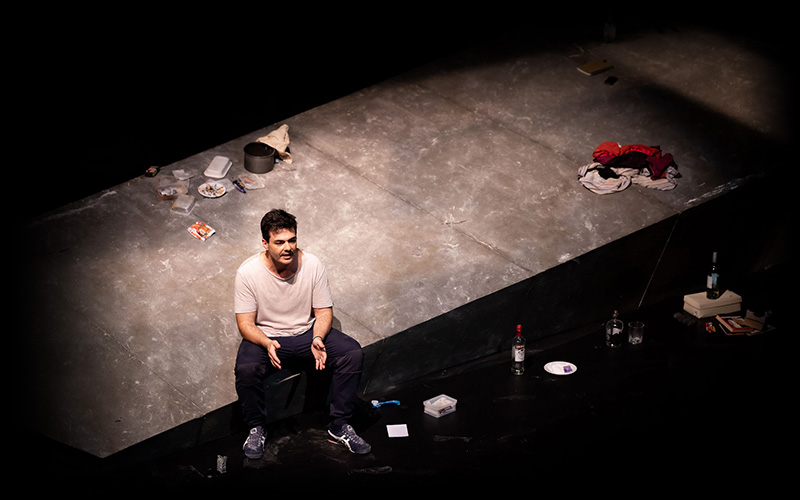
"You feel its power, the grip that it has over him, and how, in an instant, a sound can drag him back into a world he wants to leave."
The most beneficial aspect of David’s rehab was discovering how impactful trauma was and is on his life and how this may have had an impact on his dependency on drugs. Through a variety of flashbacks, we get to understand a little more of David’s family life—abusive and distant parents, possible sexual abuse when he was young, unfairly being placed in the shadow of his older, sporty brother, and the illness of his sister. All this seemed to happen at such a young age; how could anyone really come through this unscathed? And with all this he had to contend with, the only real positive he was able to gain was the support he got from a teacher during his debut theatrical production. This scene, like many before it, was played so delicately that one could not fault the power and the impact that it has. All children seek out and search for some form of validation, and for him to get this for his acting, a thing he never thought he would lean into, was profoundly touching.
This early exposure to acting really brilliantly illustrates why acting is so important to him and his life. It is the one consistent thing he’s been able to latch on to, that he’s good at, and the one thing he cannot give up on because to do so would be to give up on his life. It is through a series of flashbacks that the audience becomes more aware of David, his struggles, and the many things that have been placed on him. Interestingly, David talks at length about his sister, someone who was more of a protector of him than I think he ever realised she was, than he does about his older brother. In one of the funnier flashbacks, a young David is clearly visibly disappointed to be constantly compared to his legendary older brother. That doesn’t change the direction the play takes, and it doesn’t impact the narrative slightly. A lot of people, places, and memories fly in and out of David’s stories, but the lack of discourse over his older brother gives the impression there are more, perhaps unresolved, issues between the two of them.
One of the more effective elements of Breaking The Castle is the discussion around drugs, drug culture, and addiction, which is breathtakingly illustrated as David does a show-and-tell featuring his drug of choice, crystal meth. Even now, I can hear the sound the crystal makes as it hits the base of the glass pipe and the clicking sound the light makes. In all the noise, sweat, and movement, David pauses for a moment to tell him what these feelings mean to him, what those sounds mean to him, and how intoxicating they are. And it is this sound of the crystal hitting the bottom of the glass pipe that is repeated briefly in the distance; you hear it again and again as David talks. You feel its power, the grip that it has over him, and how, in an instant, a sound can drag him back into a world he wants to leave.
As a performer, Peter Cook engages you from the moment you meet him on the edge of the stage. The first words he utters offer insight into not only his character but also him as a person and the experiences he’s endured. But, most powerful of all, there is no blame. There is no blame towards his parents, school, or being forced into doing a job for Mortein. There is a positivity within his text and in the nature of how Cook brings David to life that is as life-affirming as it sounds. You’re rooting for David hard, and you see that what he’s having to deal with is not easy and perhaps not even solvable, but you root for him to not slip.
As for David, Cook ensures that we know that David is aware that he’s an addict and that he’s not cured; there is no cure. He’s going to be an addict for the rest of his life, and he’s going to face challenges, flashbacks, and memories that are going to hurt him and place him in a dark place, but he knows he has to maintain the strength that he’s found within himself. He knows that if he can do that, he can continue on this new, clearer path he’s created for himself, one day at a time.

ADVENTURES IN THEATRELAND
★ ★ ★ ★ ★
Oviya Thirumalai | 11 November 2023
Breaking the Castle is a one man show, written and performed by Peter Cook and directed by Bridget Boyle. The show follows David through his recovery at rehab as he overcomes his addiction, whilst also grappling with his unsteady career as an actor and playwright. The show is brilliantly written, weaving past and present together, giving us a better understanding of his traumatic past, and the issues that led him to start drinking.
It's the careful stripping away of his tough exterior to give us a glimpse at his childhood, and a thoughtfully complete revealing of these traumatic events that really help us feel their impact. It's through truly brilliant use of comedy, spoken word and theatre that Peter Cook achieves this. The writing is stunning - mixing hard truths, self-deprecating humour, sensitive reflections and a truly powerful speech at the end of the show.
The show relies heavily on imitations in the first half (Shoutout to vocal coach Linda Nicholls-Gidley) which helps bring to life his world. However whilst entertaining, it does become a little confusing to keep track of a number of nameless characters, and ultimately distracts away from David's core story. There's a sense of the show attempting to be both a serious play and also a piece of stand up comedy, but quickly finds itself. The pivotal turning point of the show comes with a tough love conversation with his therapist, and the show really excels hereafter. The originality of Cook's writing shines throughout but the scenes with his therapist particularly.
The sound design (Kimmo Vennonen) really adds to the piece, taking us through an array of emotions. It's the unsettling use of music and echo to denote David's trapped and frightened childhood self within him, that was particularly incredible. The set is simple (Ieuan Watkins), with David's possessions and clothes strewn about the stage, creating a chaotically messy environment. The use of powder and confetti for cocaine creates some stunning visual moments, but it's the use of the props of a lighter, crystal and holder that has us holding our breaths, intoxicated by Cook's acting in the moment.
Peter Cook, whilst emphasising the lows of being high, also takes us on a rollercoaster journey of the highs of being high. We're given a front row seat to the various states and emotions, and really feel the panic and paranoia that David experiences when he's lost in his own mind. Cook is a one man army, establishing himself as a performer and writer to watch out for. It's the final few moments of the show, where Cook lapses into spoken word which really brings the show together. Selecting key moments, reflections and events, he brings the audience to tears in a passionate and heartfelt speech. Now clean, David uses this speech to move, inspire and remind us of the importance of hope.
Breaking the Castle really does break down the walls and stigma around rehab and recovery (and even addiction). An absolute gem of a show, it becomes a tear-jerker tale of overcoming addition, second chances and not giving up.
ALWAYS TIME FOR THEATRE
★ ★ ★ ★
Charlotte Dawes | 18 October 2023
Written and performed by Peter Cook, Breaking the Castle shines a light on the often-misunderstood complexities of mental health and addiction. The moving piece, which had a critically acclaimed Fringe run, is inspired by Cook’s own extraordinary life experiences.
We follow the fictionalised protagonist David Smith, a struggling actor, as he navigates his precarity, set against a backdrop of substance abuse and deteriorating mental health, both stemming from past traumas. We observe how various people in David’s life, whether it be his parents or casting agents, unconsciously add to his anguish and feeling of unworthiness. An opportunity to alter the course of his life comes in the form of a rehabilitation clinic in Thailand. David eventually comes to accept that positive change will only be achieved via a commitment to confront his deeply buried traumas.
Cook skilfully traverses numerous characters at pace, ably moving the story forward and keeping the audience captivated. The simple staging, littered with clothes, empty cans and takeaway cartons aided Cook’s characterisation, but did not distract from the powerful performance.
The authenticity in Cook’s work is evident in both his performance and writing. The line “no-one chooses to become an addict” really encourages the audience to challenge how they view addiction. Beyond the overarching theme of empathy, class factors in recovery are exposed by Cook who in no uncertain terms tells us Rehab in Thailand saved his life. Of course, such luxuries are not afforded to all who fall on hard times.
This is an important piece of theatre which finely balances despair with hope and humour. Cook’s performance is spectacular, which seems somewhat ironic given he depicts a struggling actor. You will leave the theatre reflecting on how you see the world and the people who may be struggling within it.
Breaking the Castle has completed its run at The Pleasance, London and is set to play at the Old Red Lion Theatre, London 7-11 November 2023.
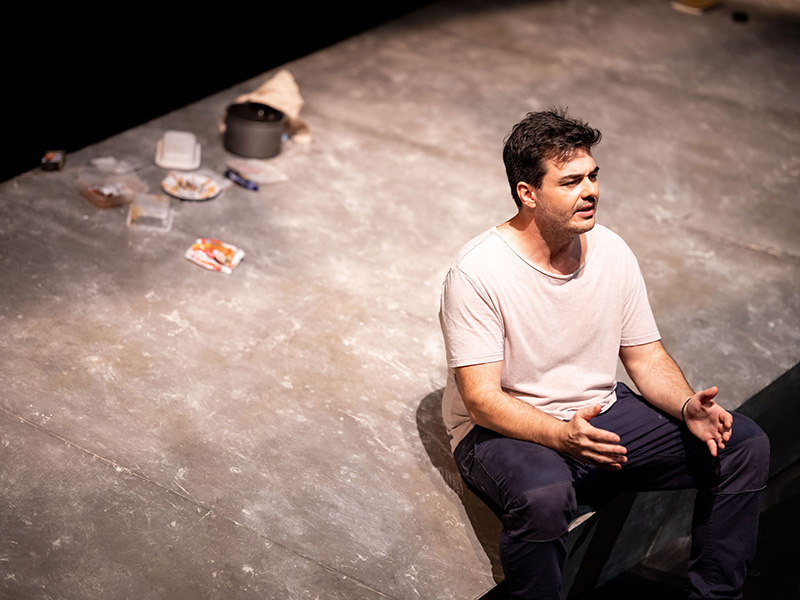
"Cook skilfully traverses numerous characters at pace, ably moving the story forward and keeping the audience captivated.”
ALWAYS TIME FOR THEATRE
NORTH WEST END UK
★ ★ ★ ★
Aditi Dalal | 7 November 2023
There must be something special about a one-man show relating to addiction and mental illness if it has toured multiple venues across Australia and the UK. With outstanding reviews and audiences engaging with the show, it is clear that the dark, heavy and sensitive themes of the play are skilfully dealt with by writer and actor Peter Cook.
The audience enters to a stage littered with some props, chairs and stools. These are creatively used across the settings that the play traverses through. Cook is a great storyteller, both with his words and performance. He tirelessly braves through the 75-minute play, sharing his own experiences with addiction and rehabilitation through the fictionalised character of David. The writing is crisp and conversational – and in a space as intimate as the Old Red Lion theatre, the audience feels drawn into David’s world. Struggling as an actor and with his inner demons, David is in denial that he has a problem. As he begins to uncover the truths about himself, he moves towards acceptance and change. The narrative highlights his rehab centre meeting, among his daily events, as we move back and forth in time. So if you are looking for a story with a traditional climax and resolution, this is not it. Rather, by witnessing David’s everyday life and his mental chatter, the audience is able to gain a deeper sense of empathy and insight into the mind of an addict.
Pulling off a one-man show is never an easy feat. Cook sustains his performance with great energy and physicality. He also plays multiple characters from different nationalities. Bridget Boyle’s masterful direction makes clever use of the space and ensures the story elicits compassion from the audience.
The highlight of the show was the beautiful light design, again making great creative use of the space and limited lighting available. The lights not only served the purpose of creating different realms on stage, but their ingenious design was art in itself. Especially with a touring production, such precision and charming thought put into the lights was a delightful surprise! The use of white powder to show drugs and how they tug on addiction was another nuance; the powder eventually morphs from being a prop into a symbol of more abstract themes.
The show ends with a poignant and powerful message as David lays out a bright towel saying, “I tried dying, and it didn’t work. I might as well try living,” Through the play, David makes no excuses for his actions, neither does he apologise for them. He simply lays bare his story, takes onus and creates a non-judgemental space to understand the mind of an addict.
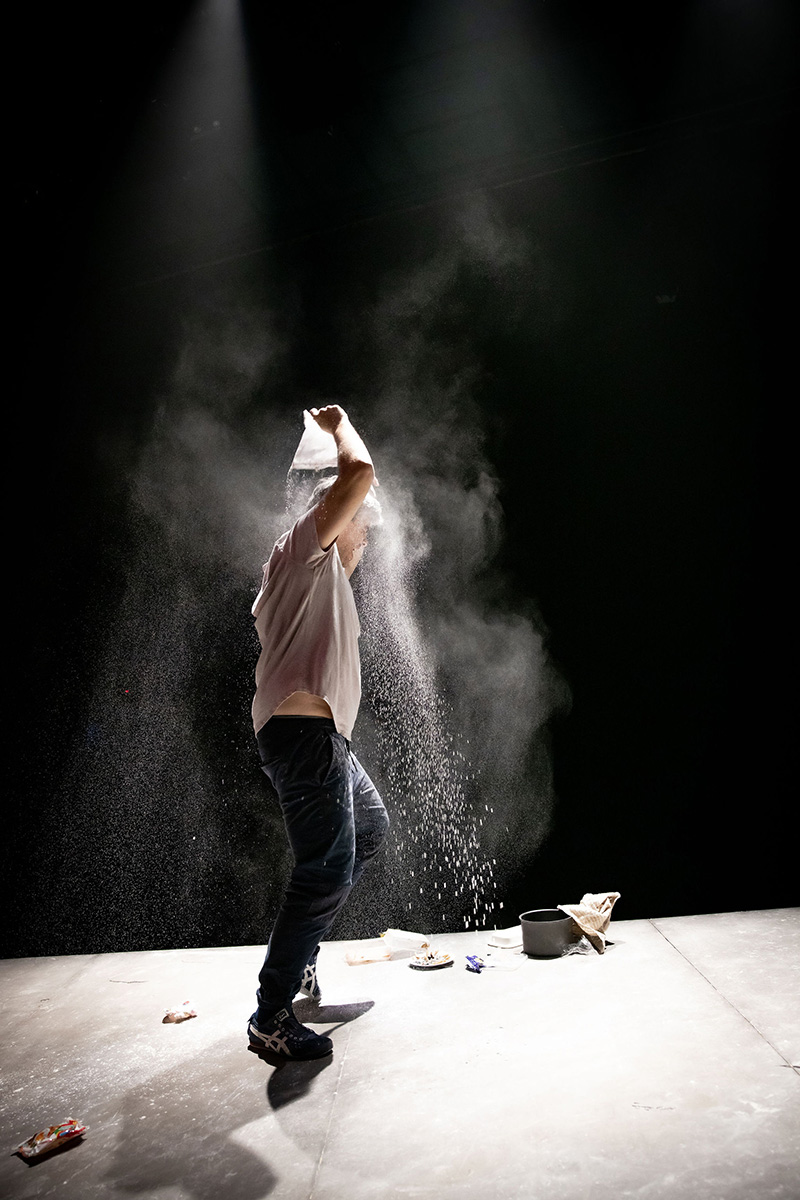
A Youngish Perspective
★ ★ ★ ★
This brilliant one-man show, written and performed by Peter Cook, runs for five nights at the Old Red Lion Theatre as part of the Pleasance’s Best of Edinburgh season. Directed by Bridget Boyle, ‘Breaking the Castle’ follows the character of David Smith through a spiral of chaos: drug addiction, gambling, social isolation, and ultimately, recovery. The play is largely based on Cook’s own experiences, and you can believe it – his portrayal of the highs and lows of addiction is extremely compelling.
Boyle and Stage Manager Ieuan Watkins make good use of the small space, keeping the set minimal: a few chairs, clothes and empty beer cans vividly conjure the sparse and rather depressing space in which Smith exists between benders. The very same stark room is cleverly transformed into the setting of euphoric highs, with the aid of bursts of white powder and intelligent intervention from sound designer Kimmo Vennonen.
Cook is, of course, entirely believable as Smith – but not just as an addict. His portrayal of trauma, isolation, and the pernicious consequences of job insecurity are equally poignant, and proof of his range as an actor.
Cook’s motive for writing the play was, at least in part, ‘to humanise people suffering with these issues’ – an aim in which he certainly succeeds, as arguably the best scene in the play is Cook’s portrayal of the insidious internal logic which governs the mind of David Smith, debating a pick-up which was always inevitably going to happen. He persuades himself that ‘we’ll get on the straight and narrow first thing tomorrow’ – and tomorrow and tomorrow and tomorrow. I doubt there was a member of the audience who did not recognise themselves in Smith at this point.
Cook leads us here to the heart of addiction, and one of the biggest obstacles to recovery: denial. Journeying with him through a 5 star rehab facility in Thailand, we learn that honesty is perhaps the most crucial step on the road to recovery. The end goal? Reality.
‘Breaking the Castle’ is a drama of universal relevance, in which the audience are intimately, unavoidably involved.
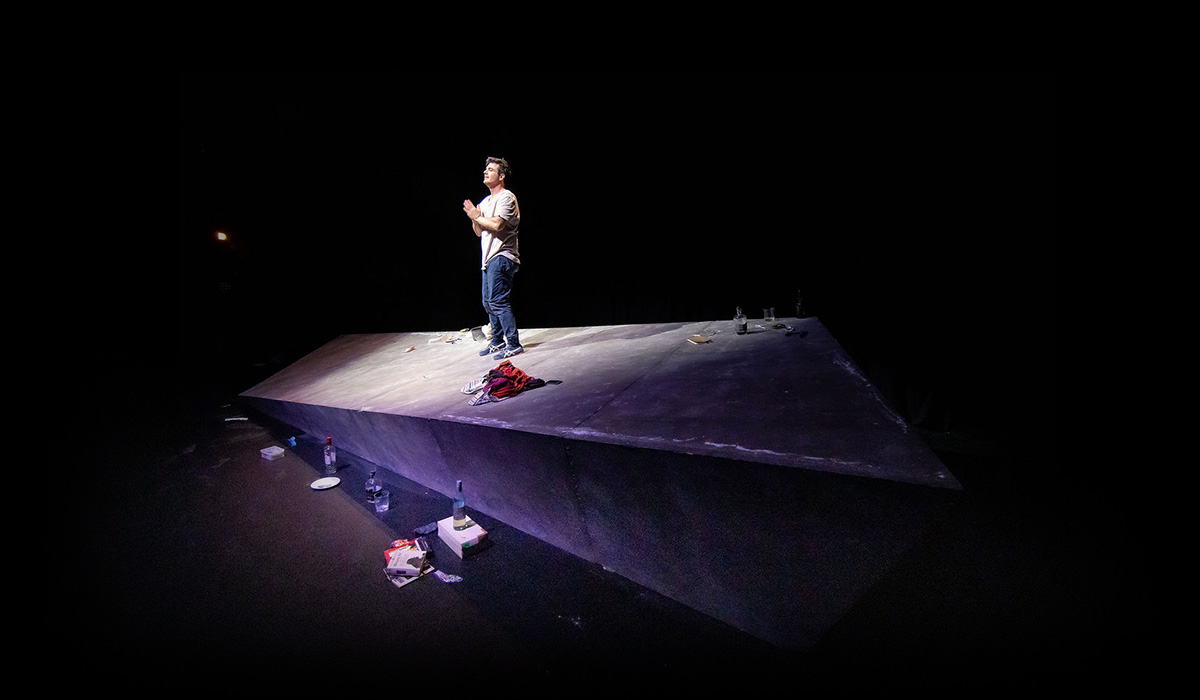
The Blog of Theatre Things
★ ★ ★ ★
The most striking aspect of Peter Cook’s powerful one man show Breaking the Castle is its authenticity. When the protagonist David tells you what it’s like to take drugs, you don’t need to have read the programme to understand that this is a man who knows what he’s talking about. The show charts David’s journey through and beyond addiction, and was inspired by true events in writer and performer Peter Cook’s life, which gives the writing an undeniable authority and makes it a gripping watch from the start.
David is a struggling actor who spends half his life at home waiting for calls from his agent, hoping that today might finally be the day he gets to play Hamlet instead of a dying cockroach. To pass the time until that day arrives, he takes drugs, and drinks, and gambles, and has sex – and then takes more drugs… Until one day he finds himself sitting in a rehab centre in Thailand, where a passionate counsellor shows him it’s possible to break out of the vicious cycle of his addiction, and make a new place for himself in both the world and his own life.
The action is fragmented and the pace frenetic as we skip backwards and forwards in time, with scenes depicting David’s rehab journey starkly contrasting against some of his lowest moments back home in Australia. Peter Cook is an engaging and energetic performer, throwing himself – sometimes literally – around the litter-strewn set and playing a multitude of characters with a multitude of accents. (In fact the number of different accents begins to be a bit distracting, and Cook’s at his strongest when playing characters who have distinctive physical characteristics – a fellow addict on the streets of Sydney’s Kings Cross and a patient he encounters during a hospital stay are particularly well depicted.)
The second half of the show brings a number of revelations about repressed childhood trauma, allowing both David and the audience to make some sense of how he got to where he is – and a recurring theme featuring butterflies injects an element of hope. There’s a surprising amount of humour, too; David’s description of his addiction is frank, honest, without a trace of self-pity, and when he smiles his whole face lights up. All this combines to make a character we can really get behind, and his evident joy in the play’s final scene is infectious.
It also helps to bring home a key message in Cook’s writing: that people who struggle with addiction are just that – people, and just as the power to acknowledge and move past it lies primarily with the individual, so the rest of us have a responsibility to look beyond our own judgment and try to see the person instead of the disease. Powerful, funny and deeply personal, Breaking the Castle has a lot to say – and it says it very well.
